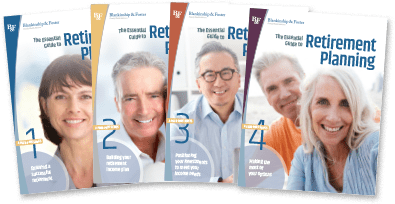Among the many decisions to consider in retirement planning, one of the biggest is where you will call home. For many retirees, the answer has been to leave the U.S. and settle in a different country. Lured by a lower cost of living, desirable destinations, and a sense of adventure, more and more U.S. retirees have moved abroad. There are over 380,000 U.S. retirees living in another country, according to the Social Security Administration.
Financial considerations of living overseas
Managing your finances can be more complex when living abroad. Technology has made it easier to conduct basic financial transactions overseas, but some aspects are still challenging.
The U.S. Patriot Act put some administrative hurdles and tax-reporting requirements for accounts registered under a non-U.S. address, and some institutions may not allow them at all. The currency exchange and transaction fees can be prohibitive, and it may be a logistical challenge to get a hold of spendable cash.
A factor many may fail to appreciate is the impact of the exchange rate on their cost of living. A poor exchange rate with the U.S. dollar can turn a low cost of living into a high one for an American retiree. And exchange rates can fluctuate, making things much more expensive from month to month. Another factor is the restrictions some places have on foreigners owning a home and conducting legal transactions. These can create hassles and sometimes financial risk.
FAQS
We’re happy to answer any questions you have about our firm and our processes. Here are answers to some of the questions we receive most frequently.

How you can create a plan to retire abroad
When planning to live abroad, it really pays to do your homework. There is a wealth of information online about living overseas. Websites such as Internationalliving.com and topretirements.com are some of the many resources you can find to help in your research.
The first thing you need to know when planning to retire abroad is about yourself. If you’ve done some foreign travel already, you know things can be different abroad than what we expect in America. These differences can be a minor inconvenience for one person, but completely unacceptable to another- especially when it’s on a long-term basis. So, you need to know where they fall for you. What are your “Must-haves” and what are your “Deal-breakers”?
“Must-have’s” may include safety and security, access to quality healthcare, and reasonable travel times to get to where friends and family are. “Deal-breakers” may include living where there is political unrest, rampant crime and corruption, or just too many close encounters with the local wildlife. Compromising on things in either category is perilous.
GUIDES
The Essential Guide to Retirement Planning
A 4-part series that answers key questions about building your plan, positioning your investments, and more.

The next step is to start researching possible destinations and chart out the number of things that come under the “Must-have” and your “Deal-breaker” headings. You may find there are a lot of things that fall under, “Could-put-up-with”, such as an unreliable internet connection, or “Would-rather-not-put-up-with”, such as a long trip to get to the nearest household goods store.
Once you’ve settled on a few possible destinations, try them out before committing to one. Rent a house in one of your top locations and try living there a while. Consider picking a time when it may be more challenging, such as summer when it’s hot or crowded. After checking a few places out, you may find that a lot of traveling in retirement is more fun than settling in one place.
Top places to retire overseas
Clearly there are many factors that make a location attractive for living overseas. The climate, the stability and safety, access to healthcare, conveniences and amenities all figure in. Some are subjective, like how well you can fit in as a retired American. Places like Costa Rica, with its huge Ex-pat community, fit the bill well in this regard. Or just the warmth of its people, such as with Ireland.
ACCREDITATIONS & AWARDS
We’re proud to have been honored by some of the organizations in our industry.

In terms of retirement planning, a low cost of living can really help you stretch your nest-egg farther. Of course, your cost of living depends on what you buy. The cost of healthcare can be a huge part of a retiree’s budget. Housing is another-what does it cost to buy or to rent, and what do energy and utilities cost locally?
To minimize this risk of fluctuating currencies on your cost of living, consider destinations that use the US Dollar, such as Ecuador, or whose currencies are pegged to the dollar, such as Bahamas, Bermuda, or Belize. Reduce the risk of financial loss by consulting with a knowledgeable attorney before purchasing property or conducting any major transactions in a foreign country.
At Blankinship & Foster, financial planning for retirees is one of our specialties. We help our clients prepare for life events and transitions such as aging and care needs. To learn more about how our proven process, “The B&F Way” helps you navigate life transitions with confidence, please contact us.

